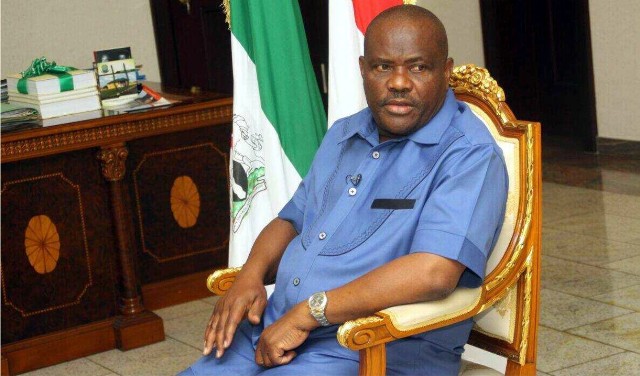Editorial
Brave, Gov Wike!

On Saturday, February 18, 2017, The Sun Newspaper made and celebrated the choice
of Governor Nyesom Ezebunwo Wike as the best of the 36 governors in Nigeria for the year 2016. The award of the ‘Governor Of The Year 2016’ which was conferred on the Rivers State Chief Executive at an elaborate ceremony of the 14th The Sun Newspaper Awards held at the Eko Hotels in Lagos was only the latest of the series of such laurels picked up by the governor.
Only weeks earlier, Governor Wike had been voted and presented with similar awards by the Authority Newspaper and the Daily Independent newspaper respectively in recognition of his outstanding performance in the delivery of democracy dividends to the people of Rivers State in less than two years in office.
In picking out Governor Wike for the prestigious award, The Sun Newspaper particularly acknowledged his five star performances in the areas of his uncommon acumen in the management of scarce resources to prosecute massive infrastructural development projects and his rare ability to fashion out ways to conquer inherited debilitating security challenges in the state.
This is in addition to the fact that while many of his peers across the country are unable to meet up with the most basic of their obligations to their people, like the payment of staff salaries and the maintenance of law and order within the borders of their states, the Rivers State governor has seamlessly kept faith with prompt payment of workers’ salaries and other social responsibilities.
Beyond and besides the reputable media organisations, several other well -meaning and most credible organisations, individuals and groups have equally recognised and acknowledged the distinguished efforts and unblemished achievements of Governor Wike. Among them are the Christian Association of Nigeria (CAN) which conferred on him the award of ‘Apostle of Peace’ while the Acting President of the Federal Republic of Nigeria, Prof. Yemi Osinbajo gave him the appellation ‘Mr. Projects’.
In commending and congratulating Chief Nyesom Ezebunwo Wike, Governor of Rivers State for the well deserved recognitions and awards received so far, The Tide acknowledges the impressive transformational achievements recorded by the present administration in Rivers State in the area of human and physical infrastructural development in so short a time in office.
We affirm that within the about 20 months in the saddle of leadership, the Wike-led government has successfully prosecuted a home-grown amnesty programme for cultists and other criminal gangs which led to a near elimination of incidences of kidnapping and other violent crimes in the state and ensured relative peace and security of lives and property.
Courtesy of the conducive atmosphere secured by the government, Port Harcourt, the State capital had hosted high profile events like the Annual General Meetings (AGMs) of the Nigerian Bar Association (NBA), the Nigerian Guild of Editors (NGE) among other national and international conferences and conventions.
Within the same period, the government has completed more than 200 internal roads, highways and bridges; undertaken the renovation and reconstruction of 13 general hospitals and rebuilt and equipped with ICT facilities several primary and secondary schools among other numerous people-oriented projects and programmes that have set the state on a steady path of progress and socio-economic transformation.
In felicitating with the governor also, we salute his NEW Rivers Vision for a totally transformed and renewed Rivers State that he has pursued with unwavering dedication, enthusiastic passion and consuming zeal and urge him to keep the fire burning.
Even so, The Tide realises that achieving the ultimate dreams of the founding fathers of a state that is peaceful, stable, viable and prosperous politically, economically, socially and materially can only come true with dedication, focus and commitment from the leadership with support, cooperation and encouragement from all and sundry.
This is why we implore Governor Wike to deliberately refuse to be distracted, no matter the pull or provocation while we enjoin all well -meaning Rivers people and lovers of the state to rally round him in his effort to put the state on a new pedestal of peace and prosperity.
We particularly urge the political class to desist from politics of division and acrimony and put all hands on deck with the governor to achieve sustainable development and give the people a better lease of life.
With 50 years of existence as a state, there is no gainsaying the fact that Rivers State and Rivers people need to focus more on the things that unite them rather than on the things that divide them; on how to attain their collective aspirations rather than on their individual accomplishments.
This is why we challenge the governor not to rest on his modest achievements in office so far but to see the accolades as a call to greater service and for Rivers people to view the awards bestowed on Governor Wike as an indication that there is more they can achieve if they work together with a sense of collective mission and purpose.
Editorial
Resolve Rumuwoji Market Issues, Others

Editorial
As NDG Ends Season 2

Editorial
Beginning A New Dawn At RSNC

-
Politics4 days ago
2027: NIGERIANS FAULT INEC ON DIGITAL MEMBERSHIP REGISTER DIRECTIVE
-

 Environment4 days ago
Environment4 days agoLAWMA Director Says Sweeping Reforms Have Improved Waste Collection
-
Politics4 days ago
LP Crisis: Ex-NWC Member Dumps Dumps Abure Faction
-

 Politics4 days ago
Politics4 days agoUmahi Dismisses Allegations On Social Media, Insists On Projects Delivery
-

 Sports4 days ago
Sports4 days agoAbia Not Sure To Secure continental Ticket
-
Politics4 days ago
NATASHA ELECTRIC VEHICLES INITIATIVE IN KOGI CENTRAL
-
Sports4 days ago
La Liga: Yamal Records First Career Hat-trick
-

 Sports4 days ago
Sports4 days agoPSG Extend Lead In Ligue 1

